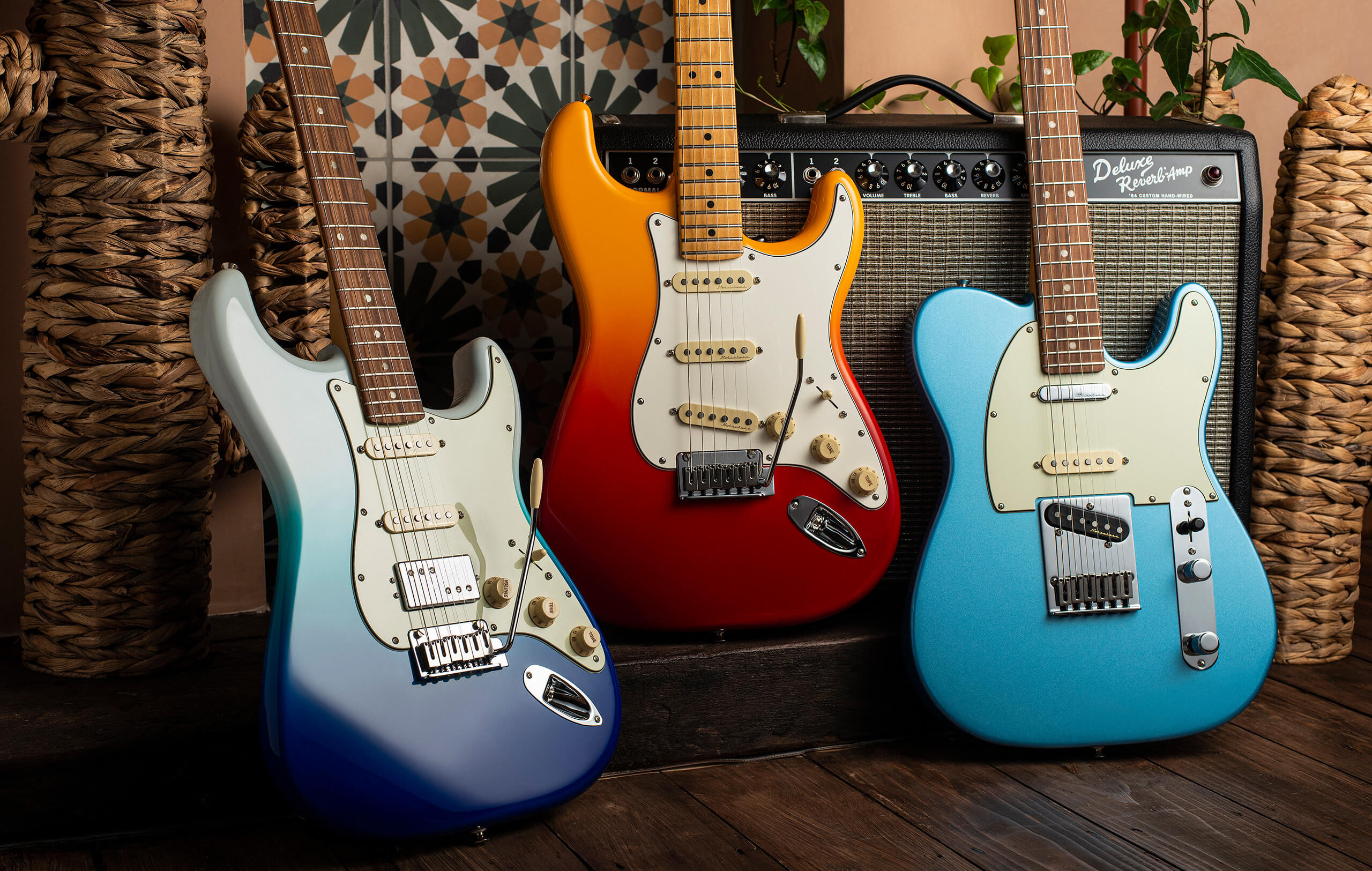<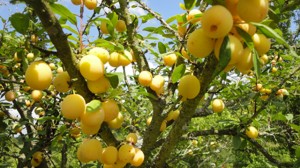
Recipe: Distill the mirabelle plum
Distillation takes place at the end of winter when the fruit trees are in bloom, often in early spring. We had chosen a rainy day to spend this day locked up, it was ideal, not too hot in the room. A slow and rigorous distillation allows us to obtain a high quality brandy.
Recipe ingredients
- The fruits are poured into barrels or vats and left to ferment naturally, in a temperate room. The most suitable temperature for regular fermentation is around 20 °: to operate under good conditions, avoid, as much as possible, letting it drop below 15 ° or rise above 25 °.
- It has been a long time since I wanted to see how a fruit is distilled, such as the mirabelle plum, the king fruit of my region, having spent a large part of my childhood among the plum trees of Courchaton.
- My friend Roger filled this gap by inviting me last Saturday to Melecey, still in Haute Saône, to come and distill the mirabelles he had picked up for this purpose during the summer of 2012.
- Wake up early in the morning to go and discover all the secrets of a good mirabelle plum, meet at 7 am in the town hall of the village. As usual, I arrived a bit late, but Roger had already lit the fire, it was good in the small room and the rain was falling constantly. The perfect weather for this kind of work. Roger as a good teacher presented the still to me.
- The still consists of 3 parts:
- – the boiler: it is the pot in which we will heat and boil the must to be distilled, here a heating known as in a bain-marie
- – the column: it is the copper tube in which the alcohol vapors rise towards the condenser
- – the condenser: as its name suggests, this is where the vapors condense into liquid alcohol. There are two types: coil or tube in tube (Liebig).
- The bowl was already loaded, I just had to take a few pictures.
- After that, you just have to wait for the boiler to build up pressure, a very short hour. A little impatient, I regularly run my hand over the column to see when it will be hot. Here it is rising in temperature and Roger tells me that the first drops should arrive at the end of the condenser.
- Attentive with my camera, I wouldn’t have wanted to miss the first drop of this long-awaited beverage. Photo, photos, photos I wander like crazy a good fifteen photos, hoping at least to make a success of one with a nice drop.
- The alcohol is flowing regularly, in a saucepan provided for this purpose, I am jubilant.
- The first liter is drawn, immediately Roger weighs the alcohol, oh wonder it is close to 73 °, that’s good, a sign of quality, we are delighted. The degrees will decrease as the liters come out, between 2 to 3 degrees of loss per liter.
- The 1st liter 73 °, 2nd liter 70, 3rd liter 68 °, 4th liter 65 ° and so on.
- Visitors arrive regularly all morning to taste and comment, a very friendly atmosphere, I ask for more.
- After 40 ° degrees of alcohol, keep it to redistillate it in the iron with other mirabelle plums.
- Dame Ginette arrives, it is well she will be able to carry the barrel, to fill the bowl.
- Taxes (to be verified) € 4.5 per 10 liter, then € 9 per liter.
- One month after the distillation Roger will adjust the drop to 52 to 53 ° by simply adding rainwater.
- Here it is finished, now it is the time which will play and improve this drop.
- Thank you to my friend Roger for this demonstration, I am now waiting for the moment when we will taste it …….
- Who can distill in France
- The distiller (endangered in France)
- The origin of this right goes back to Napoleon and the last to possess it are often retired and from the agricultural community. Several plans to remove privilege have been discussed in the National Assembly, but this subject is sensitive and the decision was postponed in 2012 (it has already been postponed many times):
- In France, owners of plots classified as orchards and vines on the land register can distill the product from their plots. The owners of alpine pastures or meadows in high altitudes can distill the gentian roots found there.
- Distillation must be done legally in a public workshop or with a professional distiller. Many Comtoises communes have a distillation workshop, however it is possible to distill in another commune in the canton, or even in the neighboring canton. You have to reserve the still. For beginners, it is advisable to be helped when using the still for the first time.
- There is also the possibility of having a power of attorney to distill. Let me explain: your neighbor (or your uncle, co-worker) owns an orchard. You harvest the fruits and ferment them (at home, at worst at home). He makes the customs declaration to distill and gives you power of attorney to accomplish the distillation (part to be completed on the doc). He then pays the taxes.
- Customs control
- How to declare to customs, complete the declaration
- This statement states:
- 1 ° The punching numbers of the stills to be used;
- 2 ° The location of the burner;
- 3 ° The date of the beginning of the works and their presumed duration, as well as the hours during which the burner will be in operation each day;
- 4 ° The nature of the raw materials to be distilled and the place where they were harvested;
- 5 ° If applicable, the volume and minimum yield per hectolitre for each species of material to be distilled or for each batch of materials of the same species having a different alcoholic strength by volume.
- Customs can control at several levels:
- – Verification that the parcel in question is registered in the land register for orchards, vines. Owner verification.
- – Verification in the field that the declared fruits indeed come from a tree in the plot (if you distill prunes, while your orchard does not have plum trees… ..). If you have to cut down fruit trees, do it after the fruit has been distilled.
- – The day of distillation: customs check the quantity and type of fruit used, the quantity of brandy and the degree of alcohol obtained. They also check the correctness of the declaration sheet (the filling times of the still must be completed with the quantity of alcohol produced)
- the boilers take about a good hour for the first drops.
- Cost 4.5 € the first 10 liters then 9 € the rest
- Customs declaration one week in advance
- The drop does not have the same degree of alcohol depending on the output the first few liters are high in degrees.
- When the drop drops below 45 °, we keep and redistill this is called ironing.
- The sources :
The sources:
http://www.arcetsenans.com/6.html
http://www.fairesagnole.eu/page61/alcfruits.html
http://droit-finances.commentcamarche.net/legifrance/70-code-general-des-impots-annexe-1/250152/bouilleurs-de-cru-se-livrant-eux-memes-aux-operations-de- distillation
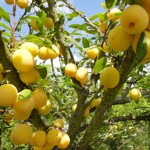
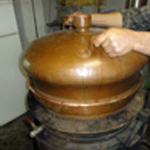 Lid
Lid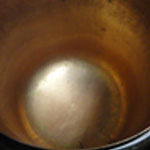 The interior of the boilers
The interior of the boilers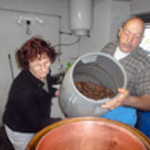 We load the boat with Dame Ginette
We load the boat with Dame Ginette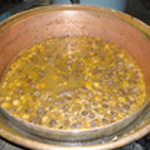 Fermented mirabelles
Fermented mirabelles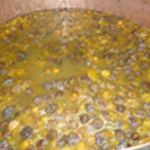 Zoom
Zoom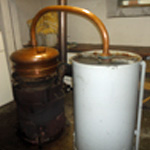 The still heats up
The still heats up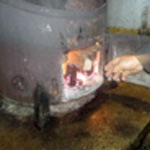 Roger puts wood
Roger puts wood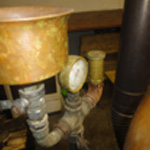 The pressure is building
The pressure is building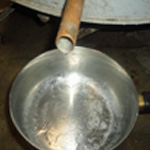 The first drop
The first drop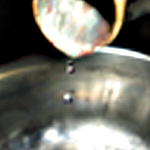 Drip
Drip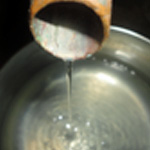 Now it’s flowing
Now it’s flowing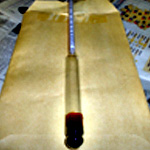 The alcohol scale
The alcohol scale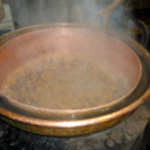 We open the boilers
We open the boilers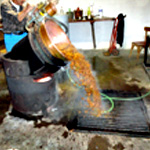 We pour in to start again
We pour in to start again


